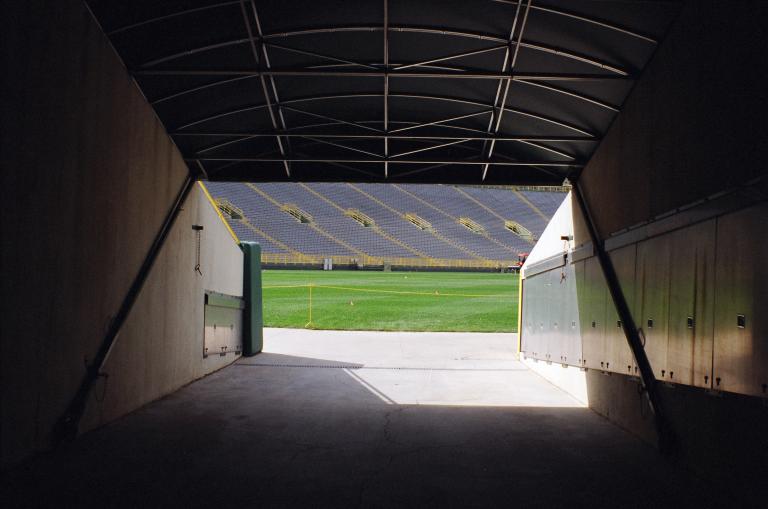I write this post on the eve of Superbowl 50, which will be the most watched television event of the year. Sports are ubiquitous in our culture, part of our collective psyche. And while commentators prognosticate about who will win and why, there is one issue that is never in doubt. All of us recognize the distinction between the locker room and the playing field; we grasp the distinct purposes of each.
The locker room is where a team preps for the game. It’s where they talk strategy, debrief, and address their injuries. The field is where the actual game is played. What happens on the field is what matters at the end of the day. The action in the locker room serves the action on the field.
In the wider contest we call life, this clarity is lacking. The thought confusion around what can rightly be called the playing field is fueling the destructive disconnect between faith and work, driving them apart in what I call the vocational divide.
Getting it Wrong
Most pastors spend most of their time motivating people to engage in church activities with the relatively small amount of discretionary time those people possess. For us pastors, Sunday is game day, our whole week is formed by the rhythm.
In the nonprofit space, the situation is not much different. Certainly we invite the business types to be on our boards and to fund our initiatives, but the conversation is titled toward our non-profit work not the work they do each day.
The implicit and explicit implication in most church and ministry settings is that the local church (as a gathered institution) or the ministry oriented nonprofit is the game. The work people do all week is in service of the game—they make money to fund it and create the stability so they can volunteer for our cause. This thinking fuels the vocational divide, creating a two-tiered spiritual class system, where the ministry professionals do what truly matters and everyone else works to support them.
This is wrong both theologically and practically.
Doubly Wrong
Practically speaking most people will spend more waking time at work than they will at any other activity over the course of their lives. The average regular church attender spends 5 hours a month at church and 200 at work. If they are very dedicated to their church or nonprofit they may squeeze out 20 hours a month. It would seem like a strange irony if God cared more about the 5-20 hours than he did about the space where we spend most our time.
Theologically speaking the explicit purpose of professional clergy is to create a spiritual locker room, to prep people for the game. (The Game is to find and fowl God’s purposes in ALL spheres of life—work, family, and community.)
So Christ himself gave the apostles, the prophets, the evangelists, the pastors and teachers, to equip his people for works of service, so that the body of Christ may be built up 13until we all reach unity in the faith and in the knowledge of the Son of God and become mature, attaining to the whole measure of the fullness of Christ. (Ephesians 4:11-13)
The work of the professional Christian is to prepare everyone else for Christian work. They provide a locker room experience, the game is played outside the four walls of the church.
Getting it Right
Thought shift for the professional Christians: I am a professional Christian. For years my own ego needs and incomplete theology fed this idea that church was the main event. It was the main event for me. But its value was that it inspired and equipped people to go out and serve their creator in the rough and tumble of the real world of work and family. I create the locker room experience with the goal of prepping my people to win in the game.
Thought shift for the working Christian: I am in the game! Church is meant to prepare me for the playing field—the game is played where I work, where I live, and where I link arms with fellow Christians to bring God’s goodness to the world.
A Key to Bridging the Vocational Divide
Seeing how church and other ministries fit into the landscape of people’s lives–getting the location of the locker room and playing field right–is a thought shift that bridges the divide. The vocational divide is the gap individuals live between their faith and work. It is a personal experience reinforced by systemic and institutional realities. Three broad areas of attention are required to form a bridge across the divide: thought, rhythms, and institutions. In this series, I’ve written about the need for faith and the recognition of Jesus expertise as thought-shifts that cross the divide. Prior posts have also addressed new thinking about our work lives to bridge the divide:
10 Reasons Your Work Matters To God
Why Your Pastor Doesn’t Talk About Your Work
Faith and Work Resources: I keep a current and curated list of great resources related to the faith and work conversation follow this link: Resources on Faith and Work
About the Author: Dr. Chip Roper writes Marketplace Faith from New York City, where he is the director of Marketplace Engagement at the New York City Leadership Center. You can learn more about him here. Chip is available for speaking, consulting, and coaching engagements. Inquire via email: croper@nycleadership.com.
Like US on Facebook: https://www.facebook.comMarketplaceInitiative/













